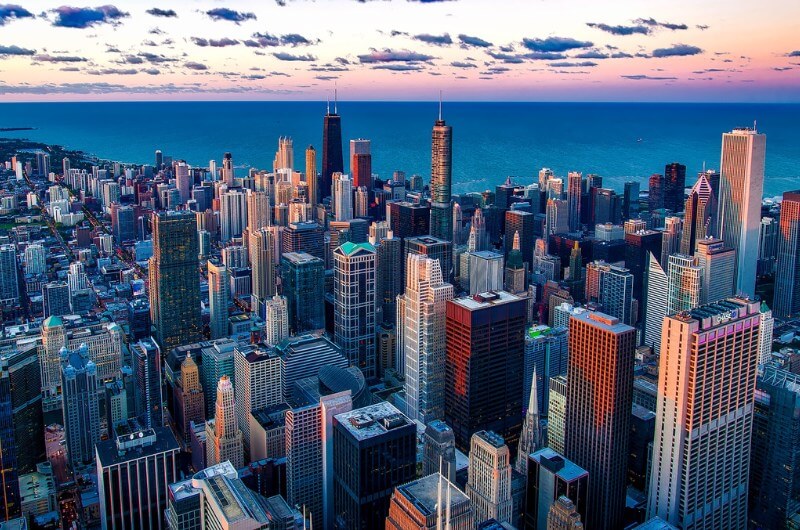
Prefer not to leave your phone number?
No problem!
Schedule an Appointment at your Convenience
(Only email is required)
Schedule an AppointmentOr Call Now
844-545-1881By: Last Updated: Jan 01, 2025
Our comprehensive moving guide offers details on the city's neighborhoods, schools, cost of living, job market, and attractions. Discover the benefits of relocating to Chicago.

Moving to Chicago and don’t know where to start? Our comprehensive guide will go through the ins and outs of a move to Chicago for a stress-free move. From the city’s diverse culture to its economic opportunities, we’ve got you covered every step of the way.
Chicago, the Windy City, is a melting pot of cultures and experiences. With a population of over 2.7 million, it boasts diverse neighborhoods, each with its unique character. The city’s architecture, arts scene, and iconic attractions like Millennium Park and Navy Pier make it a cultural hotspot.
As for the weather, expect four distinct seasons, from snowy winters to sunny summers. Chicago’s reputation for culinary delights and friendly locals is well-deserved, ensuring you’ll feel right at home.
There are various factors one should consider when thinking about moving to Chicago. Let’s go through a few:
The cost of moving to Chicago varies based on several factors, including the size of your home, the distance of your move, required services, and more.
On average, hiring a moving company for a local move in Chicago might cost you between $500 and $1,000, while a long-distance move typically ranges from $1,200 to $9,000
| Type of Service | 1 Bedroom | 2-3 Bedrooms | 4-5 Bedrooms |
|---|---|---|---|
| DIY/Truck Rental | $550 – $2250 | $700 – $4250 | $1600 – $4850 |
| Moving Container | $750 – $2750 | $1200 – $5000 | $2400 – $7900 |
| Full Service | $1300 – $3900 | $1800 – $7000 | $2500 – $9000 |
Simplify your move with our top picks for long distance movers in Chicago! The following widget features the top 3 long-distance movers in Chicago, ensuring a reliable and stress-free journey to your new home.
BEST OVERALL
BEST CUSTOMER REVIEWS
BEST FOR LONG DISTANCE
This table provides a snapshot of the pros and cons associated with moving to Chicago. Evaluating these factors will help you make an informed decision about your relocation.
When considering a move to Chicago, understanding the cost of living is crucial to planning your budget. The city offers various options for housing, transportation, and groceries, each with its financial implications.
Rental prices vary based on factors like location, size, and amenities. In downtown areas, you may find higher rental rates compared to suburban neighborhoods.
On average, a one-bedroom apartment in the city center can cost around $1,800 per month, while the same apartment outside the city center may be around $1,300 per month.
Here, prices vary widely depending on the neighborhood. The median home price in the city is approximately $280,000. Keep in mind that property taxes and maintenance costs are additional expenses to consider.
Chicago’s public transportation system, including buses and trains, offers affordable commuting options. A monthly transit pass costs around $105, providing unlimited rides on both buses and trains. Ride-sharing services and taxis are also available for additional convenience.
The cost of groceries can vary based on your dietary preferences and shopping habits. On average, a single person can spend around $300 to $400 per month on groceries. Shopping at local markets and stores can help you save on food expenses.
Budgeting for daily expenses like dining out, entertainment, and incidental purchases is always good.
An average meal at a mid-range restaurant can cost around $15 to $25, while a cup of coffee may be around $4 to $5.
While the cost of living in Chicago can vary based on your lifestyle choices, proper planning will ensure that you’re financially prepared for life in the city. Researching specific neighborhoods and tracking your spending can help you calculate your moving costs and make informed decisions and manage your budget effectively.
There are many different neighborhoods in Chicago, and each one offers a special combination of charm and cultural experiences. Some of the top areas to think about when relocating to the Windy City are listed below:
The greatest Chicago neighborhood to live in will depend on your tastes in entertainment, commutes, and lifestyle. You can locate the ideal place to call home in this exciting city by exploring these districts.
Chicago offers a diverse and dynamic job market across various industries, making it an attractive destination for professionals seeking new opportunities.
The city’s economy is robust and diversified, with strengths in finance, healthcare, technology, manufacturing, and more.
While the job market in Chicago offers numerous opportunities, competition can be intense in certain sectors. Networking, skill development, and staying updated on industry trends are essential for securing desirable positions.
Whether you’re a seasoned professional or just starting your career, Chicago’s diverse economy holds promise for many job seekers.
Chicago is renowned for its rich blend of attractions, activities, and vibrant nightlife, making it a city that caters to a diverse range of interests.
Let’s look at some of the factors that make Chicago a well-known US city:
The city’s skyline boasts architectural wonders, including the iconic Willis Tower and the historical Tribune Tower. Exploring the Chicago Riverwalk and taking an architecture boat tour provide unique perspectives of the city’s structural beauty.
Chicago is a cultural haven, boasting world-class institutions like the Art Institute of Chicago, the Field Museum, and the Museum of Science and Industry. The city’s theaters offer a variety of live performances, including Broadway shows and improv comedy.
With Lake Michigan as its backdrop, Chicago offers miles of lakefront trails, beaches, and parks. Millennium Park’s Cloud Gate (affectionately known as “The Bean”) is a must-see sculpture that draws visitors year-round.
Chicago’s culinary scene is celebrated globally, particularly for its deep-dish pizza and Chicago-style hot dogs. The city’s neighborhoods have diverse dining options, including upscale restaurants and ethnic eateries.
The city’s music scene is influenced by a history of jazz, blues, and house music. Live music venues and music festivals cater to music enthusiasts of all genres. The nightlife is equally dynamic, offering everything from rooftop bars to underground clubs.
Chicagoans are passionate about their sports teams, including the Chicago Bulls, Cubs, White Sox, Bears, and Blackhawks. Catching a game at Wrigley Field or the United Center is an unforgettable experience.
Chicago’s unique blend of attractions, diverse cultural experiences, and energetic lifestyle make it a city that never fails to captivate residents and visitors alike.
Chicago is home to numerous prestigious educational institutions that provide a wide range of educational opportunities in numerous sectors.
Renowned for its quality academic programs and groundbreaking research, the University of Chicago consistently ranks among the world’s top universities. Its strong emphasis on critical thinking and interdisciplinary studies attracts students from around the globe.
Situated just north of Chicago, Northwestern is a prestigious research university known for its strong programs in areas like business, law, journalism, and engineering. Its Evanston campus has a lovely location along Lake Michigan.
As the largest Catholic university in the U.S., DePaul offers a wide array of academic programs and a strong emphasis on experiential learning. Its downtown Chicago location provides ample opportunities for internships and networking.
Known for its engineering, technology, and architecture programs, IIT combines academic rigor with a practical approach to education. Its location within Chicago’s vibrant tech scene enhances opportunities for innovation.
For K-12 education, the Chicago Public Schools district provides a mix of magnet schools, selective enrollment schools, and neighborhood schools, catering to diverse student needs.
These institutions are just a glimpse of the educational landscape in Chicago. Whether you’re pursuing higher education or seeking quality K-12 options for your children, Chicago offers many choices to support your educational journey.
As you consider your move to Chicago, it’s evident that the city offers an array of attractions, a dynamic cultural scene, and top-tier educational opportunities. From the iconic architecture to the vibrant neighborhoods, Chicago’s diverse offerings create an environment that caters to various interests. You’ll certainly find an area in the city that matches your lifestyle. Once you’re ready to move, all that’s left is to find a long distance moving company to do the job right! Our recommendations for the best moving companies will certainly help.